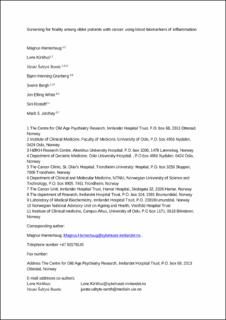Screening for frailty among older patients with cancer using blood biomarkers of inflammation
| dc.contributor.author | Harneshaug, Magnus | |
| dc.contributor.author | Kirkhus, Lene | |
| dc.contributor.author | Saltyte Benth, Jurate | |
| dc.contributor.author | Grønberg, Bjørn Henning | |
| dc.contributor.author | Bergh, Sverre | |
| dc.contributor.author | Whist, Jon Elling | |
| dc.contributor.author | Rostoft, Siri | |
| dc.contributor.author | Jordhøy, Marit Slaaen | |
| dc.date.accessioned | 2020-05-07T07:59:33Z | |
| dc.date.available | 2020-05-07T07:59:33Z | |
| dc.date.created | 2018-07-30T12:32:02Z | |
| dc.date.issued | 2018 | |
| dc.identifier.citation | Journal of Geriatric Oncology. 2018, . | en_US |
| dc.identifier.issn | 1879-4068 | |
| dc.identifier.uri | https://hdl.handle.net/11250/2653570 | |
| dc.description.abstract | As frailty is associated with inflammation, biomarkers of inflammation may represent objective measures that could facilitate the identification of frailty. Glasgow prognostic score (GPS), combines C-reactive protein (CRP) and albumin, and isscored from 0-2 points. Higher score indicates a higher degree of inflammation.Objectives: To investigate whether (1)GPS is associated with frailty,(2)GPS could be used to screen for frailty, (3) IL-6 and TNF-α add to the accuracy of GPS as a screening tool, and(4)GPS adds prognostic information in frail older cancer patients.Methods:Prospective, observational study of 255 patients ≥ 70 years with solid malignant tumours referred for medical cancer treatment.At baseline, frail patients were identified by a modified Geriatric Assessment (mGA), andblood samples were collected. Results: Mean age was 76.7years, 49.8% were frail, and 56.1% had distant metastases. The proportion of frail patients increased with higher GPS (GPSzero: 43.2%, GPSone:52.7%, GPStwo: 94.7%). GPStwowas significantly associated with frailty (OR 18.5), independent of cancer type, stage, BMI and the use of anti-inflammatory drugs. The specificity of GPS was high (99%), but the sensitivity waslow (14%). Frail patients with GPStwohad poorer survival than patients with GPS zero-one. TNF-α and IL-6 did not improve the accuracy of GPS when screening for frailty.Conclusion: Frailty and GPStwoarestrongly associated,and GPStwois a significant prognostic factor in frail, older cancer patients. The inflammatory biomarkers investigated are not suitable screening tools for frailty. | en_US |
| dc.language.iso | eng | en_US |
| dc.publisher | Elsevier | en_US |
| dc.rights | Attribution-NonCommercial-NoDerivatives 4.0 Internasjonal | * |
| dc.rights.uri | http://creativecommons.org/licenses/by-nc-nd/4.0/deed.no | * |
| dc.title | Screening for frailty among older patients with cancer using blood biomarkers of inflammation | en_US |
| dc.type | Peer reviewed | en_US |
| dc.type | Journal article | en_US |
| dc.description.version | acceptedVersion | en_US |
| dc.source.pagenumber | 7 | en_US |
| dc.source.journal | Journal of Geriatric Oncology | en_US |
| dc.identifier.doi | 10.1016/j.jgo.2018.07.003 | |
| dc.identifier.cristin | 1598963 | |
| dc.description.localcode | © 2018. This is the authors’ accepted and refereed manuscript to the article. Locked until 23.07.2019 due to copyright restrictions. This manuscript version is made available under the CC-BY-NC-ND 4.0 license http://creativecommons.org/licenses/by-nc-nd/4.0/ | en_US |
| cristin.ispublished | true | |
| cristin.fulltext | original | |
| cristin.fulltext | postprint | |
| cristin.qualitycode | 1 |
Tilhørende fil(er)
Denne innførselen finnes i følgende samling(er)
-
Institutt for klinisk og molekylær medisin [3430]
-
Publikasjoner fra CRIStin - NTNU [37304]
-
St. Olavs hospital [2447]

